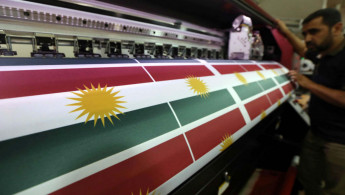Kirkuk Arabs petition UN over Kurdistan referendum
Arab representatives in the disputed Iraqi region of Kirkuk have filed a petition with the United Nations declaring their opposition to including the province in the Kurdistan independence referendum.
Burhan al-Assi, a member of the Arab bloc inside the province's council, told Almaalomah website that a memo signed by Kirkuk's Arabs had been filed to the international body.
The Kurdish government is forging ahead with its independence referendum on September 25, despite widespread criticism and warnings of more turmoil in the war-torn country.
The central government in Baghdad has repeatedly opposed the move as unconstitutional, this week voting against the referendum, and warned against including oil-rich Kirkuk as a voting constituency.
Kirkuk, home to a mixed Arab, Kurdish and Turkmen population, is one of the territories to which Baghdad and Erbil both claim sovereignty.
Kurdish Peshmerga forces have taken control of the city since driving out Islamic State militants, while Baghdad-backed Shia militias have said they will not allow Kirkuk to be part of an independent Kurdistan.
The disputed region voted in late August to take part in the referendum.
Kurdish President Masoud Barzani visited Kirkuk on Tuesday and met with representatives of its communities. He said Kurdistan was ready to fight to keep Kirkuk part of the region.
"I hope that we are not going to be forced to wage war because of Kirkuk. We do not want that to happen," Barzani told the BBC in an interview earlier this week. "But if some people want to take Kirkuk away from Kurdistan through the use of weapons, then you will see how all the Kurds are going to be prepared for a fight for this city."
The Kurds have been seeking an independent state since the end of the First World War when the current borders of the region were drawn up by the UK and France.
Kurdish territories are now split between modern-day Iraq, Syria, Turkey and Iran.
The UN said in June it will not be "engaged in any way or form" in the process, which could cast doubts on the credibility of the vote.





 Follow the Middle East's top stories in English at The New Arab on Google News
Follow the Middle East's top stories in English at The New Arab on Google News
![Israeli forces ordered bombed Gaza's Jabalia, ordering residents to leave [Getty]](/sites/default/files/styles/image_330x185/public/2176418030.jpeg?h=a5f2f23a&itok=_YGZaP1z)

